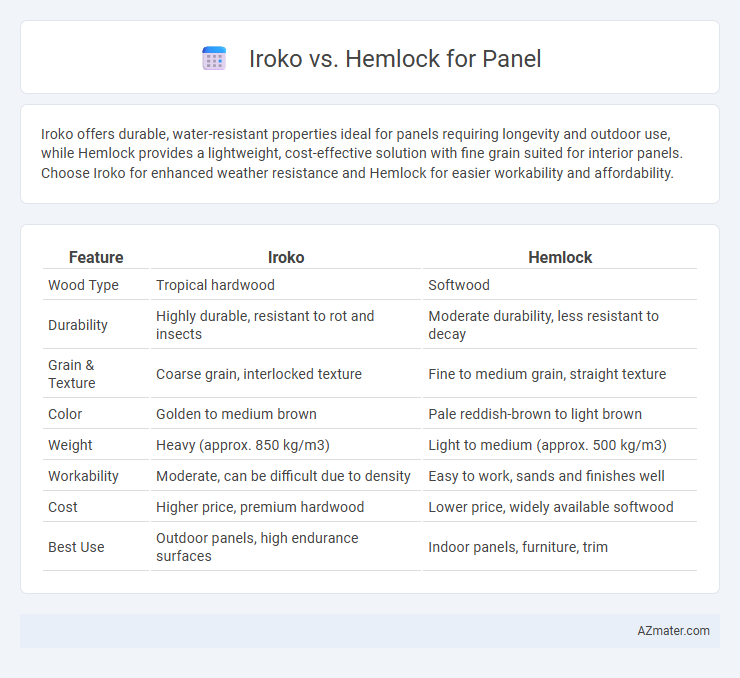Iroko offers durable, water-resistant properties ideal for panels requiring longevity and outdoor use, while Hemlock provides a lightweight, cost-effective solution with fine grain suited for interior panels. Choose Iroko for enhanced weather resistance and Hemlock for easier workability and affordability.
Table of Comparison
| Feature | Iroko | Hemlock |
|---|---|---|
| Wood Type | Tropical hardwood | Softwood |
| Durability | Highly durable, resistant to rot and insects | Moderate durability, less resistant to decay |
| Grain & Texture | Coarse grain, interlocked texture | Fine to medium grain, straight texture |
| Color | Golden to medium brown | Pale reddish-brown to light brown |
| Weight | Heavy (approx. 850 kg/m3) | Light to medium (approx. 500 kg/m3) |
| Workability | Moderate, can be difficult due to density | Easy to work, sands and finishes well |
| Cost | Higher price, premium hardwood | Lower price, widely available softwood |
| Best Use | Outdoor panels, high endurance surfaces | Indoor panels, furniture, trim |
Introduction to Iroko and Hemlock Wood
Iroko wood, known for its durability and rich golden to medium brown hues, is prized in furniture and paneling for its resistance to rot and insect attacks. Hemlock, a softwood with a pale reddish-brown color, offers a straight grain and uniform texture, making it a cost-effective choice for interior paneling and structural applications. While Iroko provides superior longevity and outdoor suitability, Hemlock's lightweight nature and ease of finishing make it popular for indoor decorative panels.
Botanical Overview: Iroko vs Hemlock
Iroko (Milicia excelsa) is a hardwood tree native to tropical Africa, known for its durability and resistance to decay, frequently used in paneling and outdoor furniture. Hemlock (Tsuga canadensis), a softwood species from North America, features fine, straight grain and is prized for its lightweight, easy-to-work properties in interior paneling. Both species exhibit distinct botanical characteristics impacting their suitability for panels, with Iroko's dense, oily texture providing superior resistance while Hemlock offers a more uniform, workable surface.
Appearance and Color Differences
Iroko wood features a warm, golden to medium brown color with subtle olive hues, often darkening with age, while Hemlock exhibits a lighter, pale cream to light brown shade with a more uniform appearance. Iroko's grain is typically coarse and interlocked, offering a distinctive textured look, whereas Hemlock has a fine, straight grain that provides a smoother, more consistent surface ideal for clean panel designs. The natural color richness and pronounced grain of Iroko make it a standout for decorative panels, contrasting with Hemlock's understated elegance and lighter tone suited for more minimalist or rustic interiors.
Durability and Lifespan Comparison
Iroko wood is highly durable, resistant to rot, and boasts a lifespan of 25-30 years in outdoor panel applications, making it suitable for long-term use. Hemlock, while moderately durable and more prone to insect attacks and weathering, typically lasts around 10-15 years without significant treatment. Choosing Iroko ensures greater longevity and reduced maintenance costs compared to Hemlock panels.
Workability and Ease of Machining
Iroko wood offers excellent workability with its interlocked grain and moderate density, allowing for smooth cutting, shaping, and sanding with minimal tool wear, making it ideal for panel applications. Hemlock, being softer and less dense, is easier to machine, exhibiting good nail and screw holding strength but may be prone to surface denting or splintering if not handled carefully. For panels requiring fine detailing and a balance between durability and ease of machining, Iroko provides superior performance, while Hemlock is suited for projects emphasizing ease of handling and cost-effectiveness.
Resistance to Moisture and Decay
Iroko wood exhibits superior resistance to moisture and decay compared to Hemlock, making it a preferred choice for panels in humid or outdoor environments. Hemlock, while lighter and easier to work with, is more susceptible to fungal decay and moisture absorption, requiring additional treatment for durability. Iroko's natural oils provide inherent protection against rot and insect attack, enhancing panel longevity without heavy chemical treatments.
Cost and Availability Analysis
Iroko wood, known for its durability and rich golden-brown color, is generally more expensive than Hemlock due to its slower growth rate and limited regional availability primarily in West Africa. Hemlock panels are more cost-effective and widely available in North America and Europe, making them a preferred choice for budget-conscious projects with moderate durability requirements. Availability challenges arise with Iroko, as sustainable harvesting is limited, whereas Hemlock benefits from extensive forestry management and faster growth cycles enhancing its market presence.
Environmental Impact and Sustainability
Iroko wood is known for its durability and moderate environmental impact, as it is sourced from fast-growing trees that help reduce deforestation pressure. Hemlock, often harvested from managed forests in North America, offers a more sustainable option due to well-regulated logging practices and faster regeneration rates. Choosing Hemlock for paneling supports sustainable forestry management, while Iroko's natural resistance to decay can reduce the need for chemical treatments, balancing environmental concerns.
Best Applications in Paneling
Iroko wood offers exceptional durability and resistance to decay, making it ideal for outdoor and high-moisture paneling applications. Hemlock, with its straight grain and smooth texture, excels in interior paneling where ease of finishing and paint adhesion are priorities. For heavy-duty exterior panels, Iroko's natural oils provide superior weather resistance, while Hemlock's affordability and workability suit decorative or structural indoor panels.
Which is Better? Choosing Between Iroko and Hemlock for Panels
Iroko wood offers superior durability and resistance to decay compared to Hemlock, making it a preferred choice for exterior panels exposed to moisture. Hemlock provides a more affordable and lightweight option, suitable for interior paneling where exposure to harsh elements is minimal. For long-lasting, weather-resistant panels, Iroko is better, while Hemlock fits well within budget-conscious projects focused on indoor use.

Infographic: Iroko vs Hemlock for Panel
 azmater.com
azmater.com